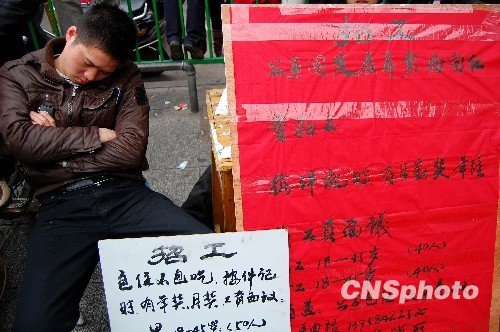Migrant workers stay home amid labor shortage
Wu Changqi, professor of strategic management at Peking University's Guanghua School of Management, said there has often been a problem of migrant workers not returning to their jobs but this year it was clearly more acute.
 |
|
A man is napping beside a want ad. |
"Working in the major manufacturing centers is no longer as attractive as it once was. When many people returned to their homes for the Spring Festival, they became aware of the opportunities that exist there," he said.
"There has been much infrastructure work in rural areas and that has created jobs there. There, the only alternative to working in places like Guangdong is no longer poorly-paid agricultural work. "
Yu Huanxin, 37, is one example. He used to be a worker in an auto parts manufacturer in Dongguan of Guangdong province but now runs a corner shop in Guiding county of Guizhou province.
Yu said he earns only 500 yuan less than he did per month in Guangdong.
"Yes, life's exciting in big cities. But here, I'm the boss you know things cost less here ... and I can take better care of my mom," he said.
Wu Zhiquan, manager of Zhicheng Recreation and Sports, said it is evident that there has been a major change in the attitudes of migrant workers.
The stationary and sports supplies company employs 130 in Foshan in Guangdong province and had an annual turnover of 20 million yuan last year.
"Four or five years ago, a migrant worker would come back after the holiday and bring some of his fellow townsmen looking for jobs. Now it seems it is not companies choosing workers, but workers choosing companies, " he said.
He said the only way to attract workers now is to offer inducements.
"We have no choice but to offer a salesperson about 1,200 yuan per month, and insurance worth almost 400 yuan, and provide them free boarding and lodging," he added.
Guo Jinxiong, chief executive officer of Hongfu Shanzhuang, a restaurant in Foshan, agrees the labor shortage is reaching some form of crisis.
"Five years ago, notices were posted in railway stations saying, 'Don't bring your fellow townsmen here' because there were just too many workers in Guangdong. We could pick and choose, but not anymore," he said.
The Yangtze River Delta areas are also facing similar challenges.
 0
0 







Go to Forum >>0 Comments